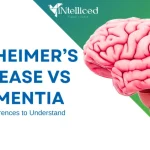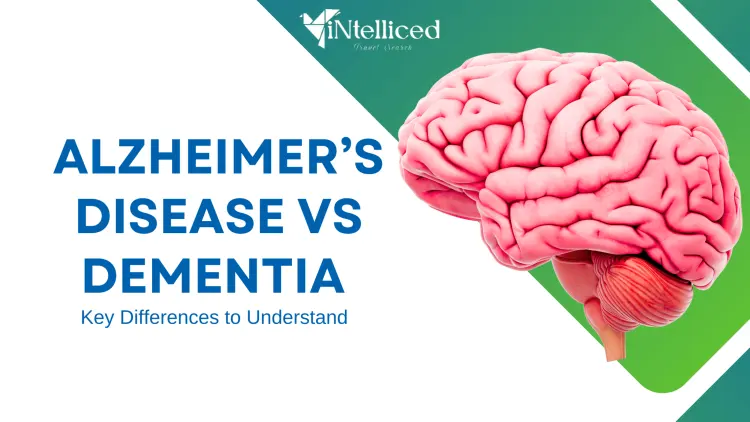When discussing memory-related disorders, people often use the terms dementia vs alzheimer’s interchangeably. However, while they are closely related and sometimes coexisting, they are not the same thing. The difference between Alzheimer’s and dementia lies in the specifics of diagnosis, underlying causes, and treatment approaches. Understanding this distinction is crucial for caregivers, medical professionals, and families dealing with these conditions.
This comprehensive guide will walk you through the nuanced differences between Alzheimer’s disease and dementia, exploring their symptoms, causes, risk factors, and treatment strategies.
What Is Dementia?
Dementia is not a specific disease but a general term that describes a decline in cognitive function severe enough to interfere with daily life. It encompasses a wide range of symptoms associated with a deterioration in memory, thinking, behavior, and the ability to perform everyday activities.
Key Characteristics of Dementia
-
Cognitive Impairment: Dementia involves a significant decline in mental ability, including memory loss, language difficulties, problem-solving issues, and impaired judgment.
-
Interference With Daily Life: The symptoms must be severe enough to interfere with a person’s daily routine and independence.
-
Progressive Nature: Most types of dementia are progressive, meaning they worsen over time.
Types of Dementia
While Alzheimer’s disease is the most common form of dementia, there are several other types, including:
-
Vascular Dementia: Often caused by stroke or problems with blood flow to the brain.
-
Lewy Body Dementia: Characterized by abnormal protein deposits in the brain.
-
Frontotemporal Dementia: Affects the front and sides of the brain, influencing personality and behavior.
-
Mixed Dementia: A combination of two or more types of dementia, typically Alzheimer’s and vascular dementia.
Understanding that dementia is a syndrome, not a disease, is essential in appreciating the broader picture. It serves as an umbrella term under which many specific medical conditions fall, each with its own causes and clinical manifestations.
What Is Alzheimer’s Disease?
Alzheimer’s disease is a specific, progressive brain disorder and the most common cause of dementia, accounting for 60–80% of cases. It primarily affects memory, language, and thought processes.
Key Characteristics of Alzheimer’s Disease
-
Memory Loss: Especially the inability to remember newly learned information.
-
Disorientation: Confusion about time and place.
-
Language Problems: Difficulty finding words, repeating sentences.
-
Impaired Judgment: Poor decision-making abilities.
-
Behavioral Changes: Mood swings, depression, apathy, or aggression.
Causes of Alzheimer’s Disease
Alzheimer’s disease is believed to be caused by a combination of genetic, environmental, and lifestyle factors. The two primary hallmarks observed in the brains of individuals with Alzheimer’s are:
-
Amyloid Plaques: Clumps of protein fragments that accumulate between nerve cells.
-
Neurofibrillary Tangles: Twisted fibers of a protein called tau that build up inside cells.
These changes lead to the death of brain cells and the shrinking of brain tissue over time, causing irreversible damage.
The Core Difference Between Alzheimer’s and Dementia
Now that we’ve defined both terms, let’s highlight the core difference between Alzheimer’s and dementia:
-
Dementia is a syndrome, a general term for symptoms that affect cognitive function.
-
Alzheimer’s disease is a specific diagnosis and the most common cause of dementia.
In simpler terms, Alzheimer’s is a type of dementia, but not all dementia is Alzheimer’s.
To draw a relatable comparison: If dementia were a fruit basket, Alzheimer’s would be the apple in the basket. Other fruits like oranges or bananas represent different types of dementia like vascular or Lewy body dementia.
Symptoms: Similar Yet Distinct
Though there is considerable overlap, the symptoms of Alzheimer’s and other types of dementia can differ.
Common Symptoms of Dementia
-
Memory loss
-
Difficulty communicating
-
Poor reasoning and judgment
-
Confusion and disorientation
-
Changes in behavior and mood
Alzheimer’s-Specific Symptoms
In addition to the general dementia symptoms, Alzheimer’s disease often includes:
-
Severe short-term memory loss
-
Difficulty forming new memories
-
Trouble recognizing familiar people
-
Withdrawal from work or social activities
-
Changes in sleep patterns
-
Wandering and getting lost
Progression of Alzheimer’s vs. Other Dementias
The progression of Alzheimer’s disease tends to follow a fairly predictable path, categorized into stages: early (mild), middle (moderate), and late (severe).
In contrast, other types of dementia may have different progression patterns. For example:
-
Vascular dementia often progresses in a “stepwise” manner, where symptoms suddenly worsen after each stroke or vascular event.
-
Lewy body dementia can fluctuate dramatically from day to day and often includes hallucinations and motor symptoms resembling Parkinson’s disease.
-
Frontotemporal dementia typically presents earlier in life (ages 45–65) and involves changes in behavior and personality more than memory issues in the initial stages.
Understanding these differences is vital in determining an accurate diagnosis and appropriate care plan.
Diagnosis: How Alzheimer’s and Dementia Are Identified
A proper diagnosis starts with recognizing the symptoms and then narrowing down the underlying cause. Because Alzheimer’s is one type of dementia, the diagnostic process includes ruling out other possible causes.
Diagnostic Tools for Dementia
-
Medical history review
-
Cognitive tests like the Mini-Mental State Examination (MMSE)
-
Neurological exams
-
Brain imaging (MRI or CT scans)
-
Blood tests to rule out vitamin deficiencies or thyroid problems
Additional Tests for Alzheimer’s
To confirm Alzheimer’s, doctors may also look for:
-
Amyloid PET scans to detect plaque buildup
-
CSF (cerebrospinal fluid) analysis for abnormal levels of tau and beta-amyloid
-
Genetic testing (especially for early-onset cases)
Accurate diagnosis is crucial because different types of dementia require different management strategies.
Risk Factors: What Increases the Chances?
Alzheimer’s Disease Risk Factors
-
Age: Risk increases significantly after age 65.
-
Family history: Having a first-degree relative with Alzheimer’s raises risk.
-
Genetics: Specific genes like APOE-e4 are associated with increased risk.
-
Lifestyle: Lack of exercise, poor diet, smoking, and excessive alcohol use.
-
Chronic conditions: Heart disease, diabetes, and high blood pressure.
Dementia Risk Factors
The risk factors for dementia overlap with those of Alzheimer’s but may also include:
-
History of stroke (linked with vascular dementia)
-
Head injuries
-
Depression
-
Hearing loss
-
Social isolation
Taking steps to manage these risk factors can lower the likelihood of developing either condition.
Treatment Options: Managing the Conditions
Unfortunately, there is no known cure for either Alzheimer’s or most types of dementia. However, treatment can help manage symptoms, improve quality of life, and slow progression.
Treatment for Alzheimer’s Disease
-
Medications:
-
Cholinesterase inhibitors (e.g., Donepezil, Rivastigmine) to improve neurotransmitter levels.
-
Memantine to regulate glutamate and improve memory.
-
New FDA-approved drugs (like Aducanumab and Lecanemab) target amyloid plaques directly.
-
-
Lifestyle interventions:
-
Regular exercise
-
Cognitive stimulation
-
Healthy diet (like the MIND or Mediterranean diet)
-
-
Supportive therapies:
-
Occupational therapy
-
Music and art therapy
-
Behavioral counseling
-
Treatment for Other Forms of Dementia
Treatment varies based on the type:
-
Vascular dementia: Managing blood pressure, cholesterol, and preventing strokes.
-
Lewy body dementia: Medications like carbidopa-levodopa for movement issues; cholinesterase inhibitors for cognitive symptoms.
-
Frontotemporal dementia: Antidepressants and behavioral therapy, as no approved medications specifically treat it yet.
Early intervention is key to slowing progression and maximizing quality of life.
Caregiving and Support
Whether it’s Alzheimer’s or another form of dementia, caregiving is often emotionally and physically taxing. As the disease progresses, individuals lose the ability to perform basic activities like eating, bathing, and communicating.
Tips for Caregivers
-
Educate yourself about the specific diagnosis.
-
Establish routines to provide structure and reduce confusion.
-
Use memory aids like labeled items or photo albums.
-
Practice patience and avoid correcting or arguing with the individual.
-
Seek support through caregiver groups, respite care, or professional counseling.
Caregivers must also take care of themselves to avoid burnout, which is common in long-term dementia care situations.
The Importance of Early Detection
Understanding the difference between Alzheimer’s and dementia can aid in early detection and intervention. While these conditions cannot be reversed, early diagnosis can help families plan better, explore treatment options, and access support systems.
Look out for early signs such as forgetfulness, difficulty completing familiar tasks, and mood changes. When these symptoms appear, consult a medical professional without delay.
Final Thoughts
In conclusion, while Alzheimer’s and dementia are closely linked, they are not synonymous. Dementia is a broad clinical syndrome, and Alzheimer’s disease is a specific, progressive brain disorder that falls under that umbrella. Recognizing this distinction allows for more accurate diagnosis, targeted treatment, and better care for individuals affected by these conditions.
Also Read: 10 Ways to Maintain Personal Hygiene In Our Environment
By spreading awareness and understanding the difference between Alzheimer’s and dementia, we can foster more empathy, provide better support for caregivers, and improve outcomes for those living with these conditions.
If you or a loved one is experiencing symptoms of memory loss or cognitive decline, don’t delay seeking professional help. Early diagnosis and intervention can make a significant difference in the journey ahead.











